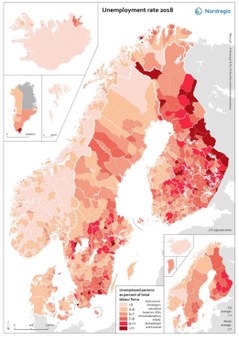Labour Market
Getting closer to members could secure union survival
Nordic trade unions must get closer to their members and provide a better service at a lower price. If not the Nordic labour market model will die, warn labour market experts.
Collective bargaining under pressure as union membership plummets
Danes - especially young men - abandon trade unions with record speed new figures show. Experts believe it can undermine the social partners’ self regulation - the so-called flexicurity model.
Transport facilities crucial to mining
Nordic politicians are waking up to the possibilities for the mining industry. On 12 October foreign ministers in the Barents Euro-Arctic Council met in the LKAB mine in Kiruna. Norway’s Jonas Gahr Støre (right below) and Sweden’s Carl Bildt arrived together on the ore train from Narvik.
Greenland’s red hot labour market
Flemming Enequist stands at the stern of a Targa 37 with 600 horse powers ploughing him through the Godthåp fjord on his way to London Mining’s base camp 150 kilometres north-east of Greenland’s capital Nuuk. He works for the local authority and his job is to tempt young Greenlanders to find work in the mining industry.
Mining equipment: a Nordic niche
Mining equipment manufacturers have been surfing on a wave of high metal prices. With increasing needs for metals in countries like China, India and Brazil, sales and employment figures keep rising.
New Norwegian drive to find jobs for people with impaired work abilities
Organisations for people with disabilities along with the social partners didn’t hold back their praise when Norway’s Minister for Labour Hanne Bjurstrøm and Minister for Children, Equality and Social Inclusion Audun Lysbakken presented their ‘Job strategy for people with impaired work ability‘ during the presentation of Norway’s 2012 budget on 6 October.
SCB has surveyed the unemployed for 50 years
There are 4.5 million people in employment in Sweden - one million more than 50 years ago. That is one conclusion to be drawn from Statistics Sweden’s (SCB) monthly labour market figures delivered over the past 50 years. SCB’s labour surveys, known as AKU, have helped politicians, economists, journalists and other decision makers to get to know the state, development and dynamics of Sweden’s labour market.
Helle Thorning-Schmidt: Danes must work more
More people must work more, productivity must increase and salaries will freeze. These are central elements to Denmark’s new centre-left government’s labour market policy, which has been relatively well received by both employers’ and workers’ organisations.
An election coloured by crisis
Which politicians can best guide Denmark through the current economic crisis, where more and more Danes fear going bust or end up unemployed? That is the deciding question in the Danish elections this month.
Finland hunts for a new salary model
Finland’s social partners are desperately looking for a new negotiation model. Or rather: the trade unions are trying their hardest to convince employers that a 40 year old labour market institution is still relevant.
Editorial: A common Nordic labour market but not common public goods
What would happen in the Øresund region if 20 to 30,000 commuters across the bridge between Sweden and Denmark decided it was time to take action?
Ole Norrback: Border obstacles are all about political will
While Nordic politicians talk about the challenges of globalisation and how to turn the Nordic region into a dynamic region of growth, new border obstacles emerge to complicate lives of citizens and businesses alike.
The ten most serious border obstacles
Border obstacles are not only things that make it difficult for Nordic citizens to settle down and work in a different Nordic country from their own. They are also problems which arise when you move back home, when you fall ill or when you need to draw your pension. NLJ and the Freedom of Movement Forum have drawn up a list of the ten most important border obstacles for working life.
Nordic working group to suggest how to remove border obstacles
A Nordic working group has been commissioned to present solutions for how to remove 39 border obstacles identified as being to the detriment of working life and social insurance systems in the Nordic countries.
New ways of life increase need for Nordic ombudsman
Border obstacles have been on the political agenda since the Common Nordic Labour Market was established in 1954. When one obstacle is removed, another pops up.
Free workplace language training in Denmark
All foreigners with permanent residency in Denmark are entitled to Danish language lessons. Many language courses are held in the workplace, and businesses see the benefits of in-house language training.
Work is top priority in integration of Sweden's new arrivals
As soon as newly arrived refugees are granted permission to stay in Sweden the process of getting them established in society begins. The goal is to cut the time it takes to get settled into the labour market. Those who want to can use personal guides who'll help them with work and integration.
FMs Lavrov and Støre call border agreement small yet important
Norway's and Russia's Foreign Ministers signed an agreement on 2 November making it much easier for 9,000 Norwegians and 45,00o Russians to visit each other.
Russian Arcady's weekly commute to Finland
Many travel the 400 kilometres between Helsinki and St Petersburg on business. Yet despite improved communications, a common labour market still is some time away.
Finland's Anni Sinnemäki: passionate about an individually tailored welfare system
Finland's Minister of Labour wants to make individuals visible. Young people should not be seen as a uniform group but as separate people with different needs. In Finland a lot of time has been spent analysing each person's situation, and as a result, she says, the state can offer more rational measures tailored to the individual's needs.
Document Actions



 Follow us on Facebook
Follow us on Facebook
